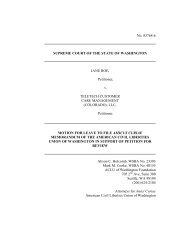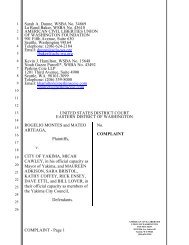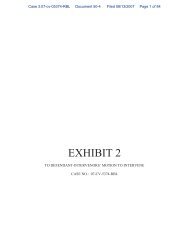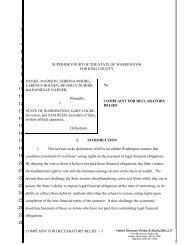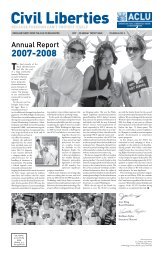BERGER v. CITY OF SEATTLE - ACLU of Washington
BERGER v. CITY OF SEATTLE - ACLU of Washington
BERGER v. CITY OF SEATTLE - ACLU of Washington
Create successful ePaper yourself
Turn your PDF publications into a flip-book with our unique Google optimized e-Paper software.
<strong>BERGER</strong> v. <strong>CITY</strong> <strong>OF</strong> <strong>SEATTLE</strong><br />
rights <strong>of</strong> the State to limit expressive activity are<br />
sharply circumscribed. At one end <strong>of</strong> the spectrum<br />
are streets and parks . . . . In these quintessential<br />
public forums, the government may not prohibit all<br />
communicative activity.<br />
213<br />
Perry, 460 U.S. 37, 46 (1983). However, “[t]he principles <strong>of</strong><br />
First Amendment are not to be treated as a promise that<br />
everyone with opinions or beliefs to express may gather<br />
around him at any public place and at any time a group for<br />
discussion or instruction.” Poulos v. New Hampshire, 345<br />
U.S. 395, 406 (1953); see also Near v. Minnesota, 283 U.S.<br />
697, 716 (1931) (“[P]rotection even as to previous restraint is<br />
not absolutely unlimited.”).<br />
[2] “Expression, whether oral or written or symbolized by<br />
conduct, is subject to reasonable time, place, or manner<br />
restrictions.” Clark v. Comty. for Creative Non-Violence, 468<br />
U.S. 288, 293 (1984). Such restrictions must satisfy three conditions<br />
to be enforceable: (1) they must be “justified without<br />
reference to the content <strong>of</strong> the regulated speech,” 8<br />
(2) they<br />
must be “narrowly tailored to serve a significant governmental<br />
interest,” and (3) they must “leave open ample alternative<br />
channels for communication <strong>of</strong> the information.” Id. In applying<br />
this three-pronged test to the five rules challenged at bar,<br />
we review the district court’s grounds for summary judgment<br />
de novo. Lopez v. Smith, 203 F.3d 1122, 1131 (9th Cir. 2000)<br />
(en banc).<br />
8 A rule failing the content-neutrality threshold must withstand strict<br />
scrutiny: “For the State to enforce a content-based exclusion it must show<br />
that its regulation is necessary to serve a compelling state interest and that<br />
it is narrowly drawn to achieve that end.” Perry, 460 U.S. at 46 (emphasis<br />
added).




